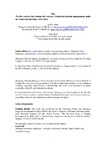Mostrar o rexistro simple do ítem
'For the workers but without the workers': industrial accident management under the Franco dictatorship (1939-1966)
| dc.contributor.author | Vilar Rodríguez, Margarita | |
| dc.contributor.author | Pons Pons, Jerònia | |
| dc.date.accessioned | 2024-04-12T06:31:41Z | |
| dc.date.available | 2024-04-12T06:31:41Z | |
| dc.date.issued | 2020 | |
| dc.identifier.citation | Vilar-Rodríguez, M., & Pons-Pons, J. (2020). ‘For the workers but without the workers’: industrial accident management under the Franco dictatorship (1939-1966). Labor History, 61(5–6), 503–521. https://doi.org/10.1080/0023656X.2020.1836139 | es_ES |
| dc.identifier.issn | 0023-656X | |
| dc.identifier.uri | http://hdl.handle.net/2183/36157 | |
| dc.description.abstract | [Abstract]: In the first decades of this century, Spain still has a high industrial accident rate compared with other Western European countries. Within the framework of the most recent historiographical theses, this paper analyses the historical roots of this situation, focusing on the institutions that historically managed industrial accident insurance coverage, especially during the first decades of the Franco Dictatorship (1939-1966). This study examines how Francoist social policy favoured employers by prolonging the control of this insurance in the hands of private institutions, insurance companies and, above all, employers’ industrial accident mutuals, which excluded worker participation in its management and promoted this social coverage as a business. Archival and statistical documentation makes it possible to demonstrate that entities such as the employers’ industrial accident mutuals managed a substantial volume of the premiums paid by employers, which brought them significant profits through the refund of part of these premiums in the form of rebates. This was possible because at the same time they destined no or negligible funding to prevention and rehabilitation of workers. Ultimately, employers’ management of this insurance allowed them to meet this obligation cheaply, while maintaining a historically high accident rate in Spain and hindered the development of a culture of prevention of occupational risks. | es_ES |
| dc.description.sponsorship | This work was supported by the European Union, the European Regional Development Fund (ERDF), and Spain’s Ministry of Science and Innovation - State Research Agency- for the project entitled "The historical keys of hospital development in Spain and its international comparison during the twentieth century", Number. RTI2018-094676-B-I00 | es_ES |
| dc.language.iso | eng | es_ES |
| dc.publisher | Taylor & Francis/Routledge | es_ES |
| dc.relation | info:eu-repo/grantAgreement/AEI/ Plan Estatal de Investigación Científica y Técnica y de Innovación 2017-2020/ RTI2018-094676-B-I00/ES/LAS CLAVES HISTORICAS DEL DESARROLLO HOSPITALARIO EN ESPAÑA Y SU COMPARACION INTERNACIONAL DURANTE EL SIGLO XX | es_ES |
| dc.relation.uri | https://doi.org/10.1080/0023656X.2020.1836139 | es_ES |
| dc.rights | Atribución-NoComercial-SinDerivadas 4.0 | es_ES |
| dc.rights.uri | http://creativecommons.org/licenses/by-nc-nd/3.0/es/ | * |
| dc.subject | Industrial accidents | es_ES |
| dc.subject | Employers´ mutuals | es_ES |
| dc.subject | Social risks | es_ES |
| dc.subject | Europe | es_ES |
| dc.subject | Spain | es_ES |
| dc.subject | Francoism | es_ES |
| dc.subject | Twentieth century | es_ES |
| dc.title | 'For the workers but without the workers': industrial accident management under the Franco dictatorship (1939-1966) | es_ES |
| dc.type | info:eu-repo/semantics/article | es_ES |
| dc.rights.access | info:eu-repo/semantics/openAccess | es_ES |
| UDC.journalTitle | Labor History | es_ES |
| UDC.volume | 61 | es_ES |
| UDC.issue | 5-6 | es_ES |
| UDC.startPage | 503 | es_ES |
| UDC.endPage | 521 | es_ES |
| dc.identifier.doi | https://doi.org/10.1080/0023656X.2020.1836139 |
Ficheiros no ítem
Este ítem aparece na(s) seguinte(s) colección(s)
-
GI-GEHE - Artigos [118]






